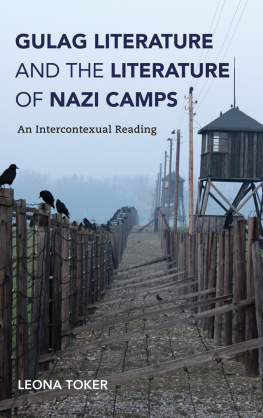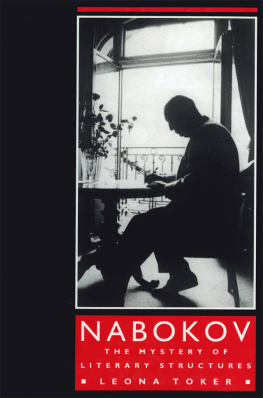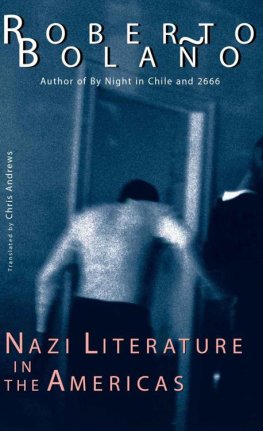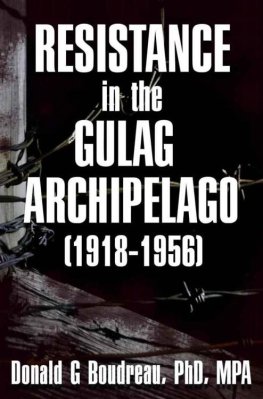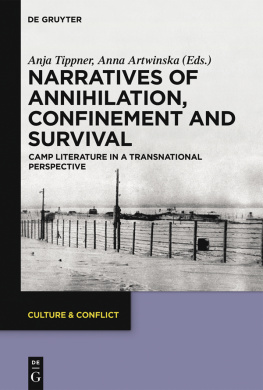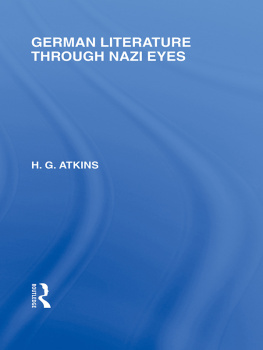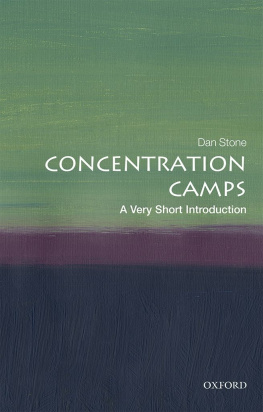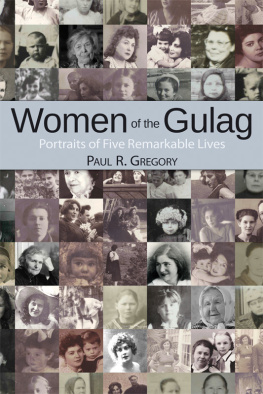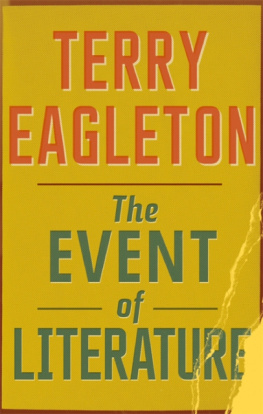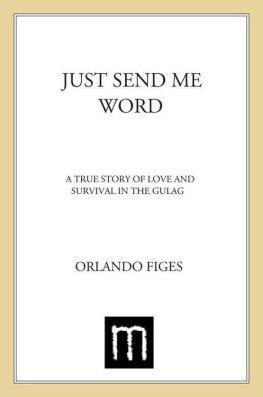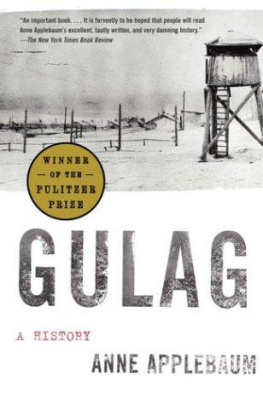Leona Toker - Gulag Literature and the Literature of Nazi Camps
Here you can read online Leona Toker - Gulag Literature and the Literature of Nazi Camps full text of the book (entire story) in english for free. Download pdf and epub, get meaning, cover and reviews about this ebook. year: 2019, publisher: Indiana University Press, genre: Religion. Description of the work, (preface) as well as reviews are available. Best literature library LitArk.com created for fans of good reading and offers a wide selection of genres:
Romance novel
Science fiction
Adventure
Detective
Science
History
Home and family
Prose
Art
Politics
Computer
Non-fiction
Religion
Business
Children
Humor
Choose a favorite category and find really read worthwhile books. Enjoy immersion in the world of imagination, feel the emotions of the characters or learn something new for yourself, make an fascinating discovery.
- Book:Gulag Literature and the Literature of Nazi Camps
- Author:
- Publisher:Indiana University Press
- Genre:
- Year:2019
- Rating:3 / 5
- Favourites:Add to favourites
- Your mark:
- 60
- 1
- 2
- 3
- 4
- 5
Gulag Literature and the Literature of Nazi Camps: summary, description and annotation
We offer to read an annotation, description, summary or preface (depends on what the author of the book "Gulag Literature and the Literature of Nazi Camps" wrote himself). If you haven't found the necessary information about the book — write in the comments, we will try to find it.
Gulag Literature and the Literature of Nazi Camps — read online for free the complete book (whole text) full work
Below is the text of the book, divided by pages. System saving the place of the last page read, allows you to conveniently read the book "Gulag Literature and the Literature of Nazi Camps" online for free, without having to search again every time where you left off. Put a bookmark, and you can go to the page where you finished reading at any time.
Font size:
Interval:
Bookmark:
Table of Contents
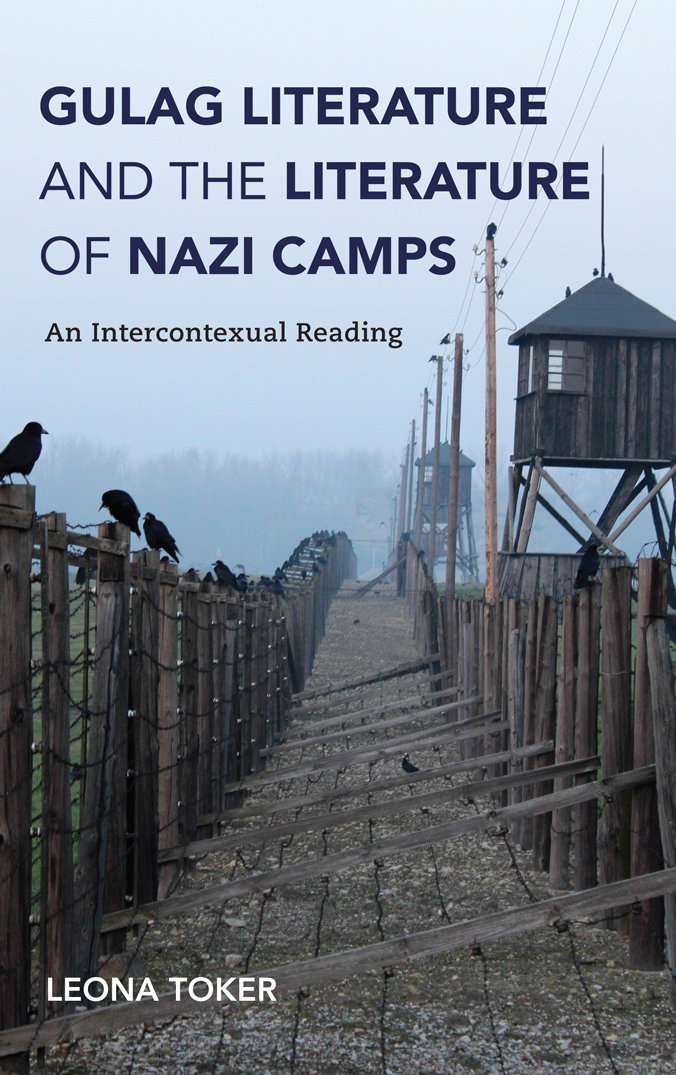
GULAG LITERATURE AND THE
LITERATURE OF NAZI CAMPS
JEWISH LITERATURE AND CULTURE
Alvin H. Rosenfeld, editor
GULAG LITERATURE
AND THE LITERATURE
OF NAZI CAMPS
An Intercontextual Reading
Leona Toker
INDIANA UNIVERSITY PRESS
This book is a publication of
Indiana University Press
Office of Scholarly Publishing
Herman B Wells Library 350
1320 East 10th Street
Bloomington, Indiana 47405 USA
iupress.indiana.edu
2019 by Leona Toker
All rights reserved
No part of this book may be reproduced or utilized in any form or by any means, electronic or mechanical, including photocopying and recording, or by any information storage and retrieval system, without permission in writing from the publisher. The paper used in this publication meets the minimum requirements of the American National Standard for Information SciencesPermanence of Paper for Printed Library Materials, ANSI Z39.48-1992.
Manufactured in the United States of America
Cataloging information is available from the Library of Congress.
ISBN 978-0-253-04351-1 (hdbk.)
ISBN 978-0-253-04353-5 (pbk.)
ISBN 978-0-253-04354-2 (web PDF)
1 2 3 4 5 24 23 22 21 20 19
To Iris, Nitzan, and Ariel
I imagine there will be a flood of accounts.... Their value will depend on the worth of the witness, his insight, his judgment.
... And then there will be documents.... Later, historians will collect, classify, analyze this materials, drawing on it for scholarly words.... Everything will be said, put on record.... Everything in these books will be true... except that they wont contain the essential truth, which no historical reconstruction will ever be able to grasp, no matter how thorough and all inclusive it may be.
The others look at him, nodding, apparently reassured to see that one of us can formulate the problem so clearly.
The other kind of understanding, the essential truth of the experience, cannot be imparted.... Or should I say, it can be imparted only through literary writing.
He turns toward me, smiling. Through the artifice of a work of art, of course!
Jorge Semprn, Literature or Life
Contents
M Y WORK ON this book continued the attempts made in Return from the Archipelago (Indiana University Press, 2000) to approximate an understanding of a specifically twentieth-century kind of suffering, that of the inmates of concentration camps. It is a tribute to the survivors of the Nazi and Soviet camps who have testified to their experience, often creating accounts to which one turns for the facts but on which one lingers owing to their art of representation.
I am grateful to the colleagues who have encouraged this project and given me the benefit of their insights. I mourn the passing of the earliest advisors of this workH. M. Daleski (the Hebrew University of Jerusalem), Geoffrey Hartman (Yale), and Emily Budick (the Hebrew University of Jerusalem). Alvin Rosenfeld of the University of Indiana, whose book on Holocaust literature was one of the first I read, as is true for thousands of others, has lent support to this project, read its results with constructive criticism, and gave me much valuable advice. The criticism of David Roskies (Jewish Theological Seminary and the Hebrew University) has led to an important change in the structure of the work; the expertise of Jeff Wallen (Hampshire College) has led both to tightening the material and to filling in gaps. At different stages of the work I have been stimulated by discussions with Pekka Tammi (Tampere University), Anja Tippner (Hamburg University), Elena Mikhailik (University of New South Wales), the writer and Shalamov scholar Valery Esipov (Vologda Exile Museum), Omri Ronen (University of MichiganAnn Arbor), Beth Holmgren (Duke University), Markku Lehtimki (University of Eastern Finland), Nora Buhks and Luba Jurgenson (the Sorbonne), Natalia Pervukhina (University of TennesseeKnoxville), Jakob Lothe (University of Oslo), Gennady Barabtarlo (University of MissouriColumbia), and Meir Sternberg, Tamar Yacobi, and Dan Laor (Tel Aviv University), as well as with my Hebrew University colleagues Yehiel Szeintuch, Dimitri Segal, Shlomith Rimmon-Kenan, Sidra Ezrachi, Amos Goldberg, Manuela Consonni, Esther Cohen, Edward Waysband, and David Stromberg.
Earlier versions of different portions of the material have appeared in the following publications: On the legitimacy of comparisons: the Gulag goner and the Auschwitz Muselmann, in Jews and Slavs, vol. 14, Festschrift for Professor Ilya Serman, 32530 (Jerusalem: Gesharim; Moscow: Mosty kultury, 2004; in Russian); Testimony and Doubt: Varlam Shalamovs How It Began and Handwriting, in Real Stories: Imagined Realities: Fictionality and Non-fictionality in Literary Constructs and Historical Contexts, ed. Markku Lehtimki, Simo Leisti, and Marja Rytknen, 5167 (Tampere, Finland: Tampere University Press, 2007); Varlam Shalamovs signs and symbols, in Paths in Art: Symbolism and European Culture in the 20th Century, ed. D. M. Segal and N. M. Segal Rudnik, 38090 (Moscow: Vodolei, 2008; in Russian); Textes littraires et documents darchives: entre lision et allusion, in Le Goulag en heritage: Pour une anthropologie de la trace, ed. Elisabeth Anstett and Luba Jurgenson, 8999 (Paris: Ptra, 2009)revised English and Russian versions published as Literary Texts and Archival Documents: Between Elision and Allusion, Gulag Studies 23 (200910): 5567, and Literatura i dokument: Opyt vzaimoprochtenia in Varlam Shalamov v kontekste mirovoi literatury i Sovetskoi istorii, ed. S. M. Soloviev, 10310 (Moscow: Litera, 2013); Folk Theodicy in Concentration Camps: Literary Representations, in Knowledge and Pain, ed. Esther Cohen, Leona Toker, Manuela Consonni, and Otniel E. Dror, 21129 (Amsterdam: Rodopi, 2012); Rereading Varlam Shalamovs June and May: Four Kinds of Knowledge, in (Hi-)stories of the Gulag: Fiction and Reality, ed. Felicitas Fischer von Weikersthal and Karoline Thaidigsmann, 193203 (Heidelberg: Universittsverlag Winter, 2016); Representation of Forced Labor in Shalamovs Wheelbarrow I and Wheelbarrow II, Mmoires en jeu / Memories at Stake 1 (September 2016): 7785; A reconsideration of the concept of heroism in Shalamovs stories, in Zakon soprotivleniya raspadu: Osobennosti prozy i poezii Varlama Shalamova i ikh vospriyatie v nachale XXI veka, ed. Lukasz Babka, Sergey Soloviev, Valery Esipov, and Ian Makhonin, 6978 (Prague: Nrodn knihovna esk republiky, 2017; in Russian); and Towards a Literary History of Concentration Camps: Comparative of Entangled, in Narratives of Annihilation, Confinement, and Survival, ed. Anna Artwiska and Anja Tippner, 1329 (Berlin: de Gruyter, 2019). I thank the editors of these collections, as well as Professor Olga Cooke, editor of Gulag Studies, for their feedback.
The structure and texture of this book implements the lessons learned from Michael Scammells comments on Return from the Archipelago and from the editorial supervision of that 2000 publication by Janet Rabinovich and Dee Mortensen.
I am grateful to my mother, Professor Nedda Strazhas, my first reader, critical and encouraging. My husband, Gregory Toker, has likewise been consistently supportive and made important comments on the logic of the analysis.
In 20042007 the project received the generous support of the Israel Science Foundation, grant 435/04. The help of my research assistant, Irina Lyan (now Dr. Lyan), in the framework of this grant, has been invaluable.
GULAG LITERATURE AND THE
Font size:
Interval:
Bookmark:
Similar books «Gulag Literature and the Literature of Nazi Camps»
Look at similar books to Gulag Literature and the Literature of Nazi Camps. We have selected literature similar in name and meaning in the hope of providing readers with more options to find new, interesting, not yet read works.
Discussion, reviews of the book Gulag Literature and the Literature of Nazi Camps and just readers' own opinions. Leave your comments, write what you think about the work, its meaning or the main characters. Specify what exactly you liked and what you didn't like, and why you think so.

